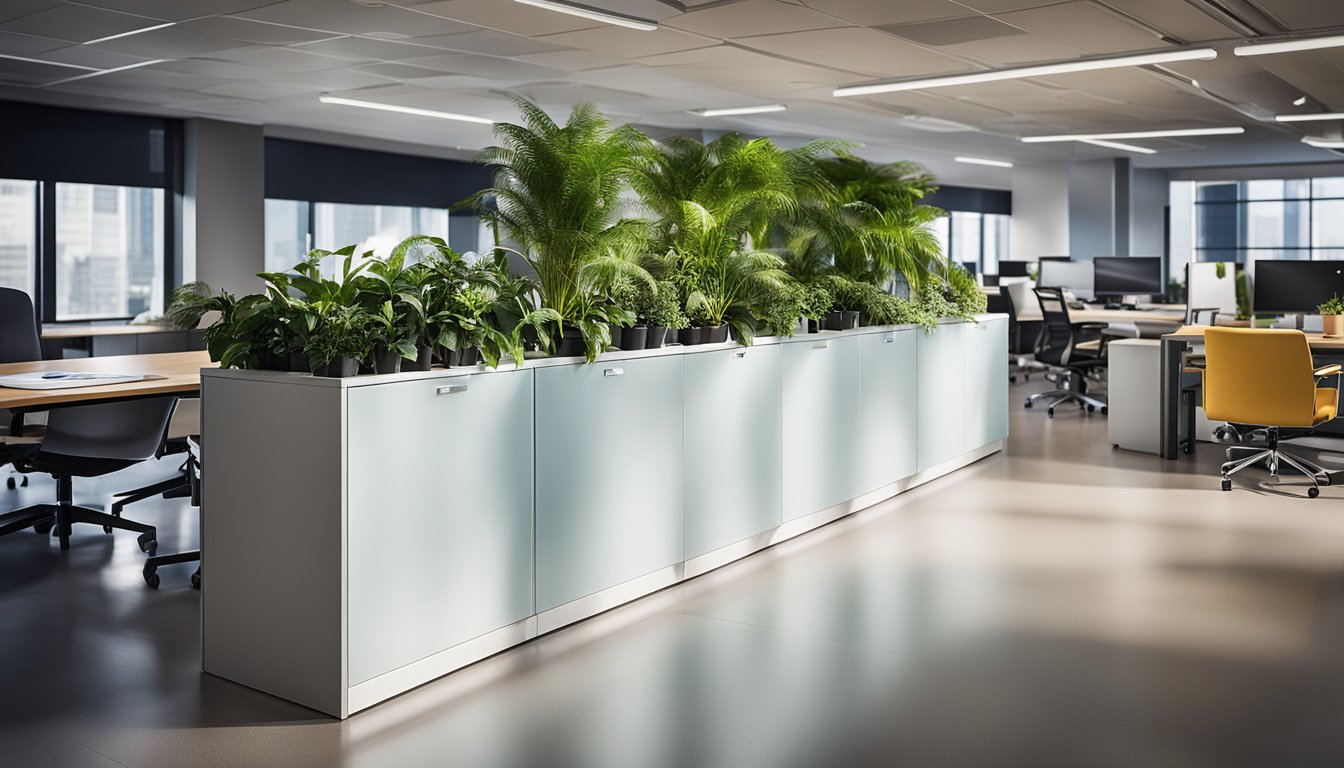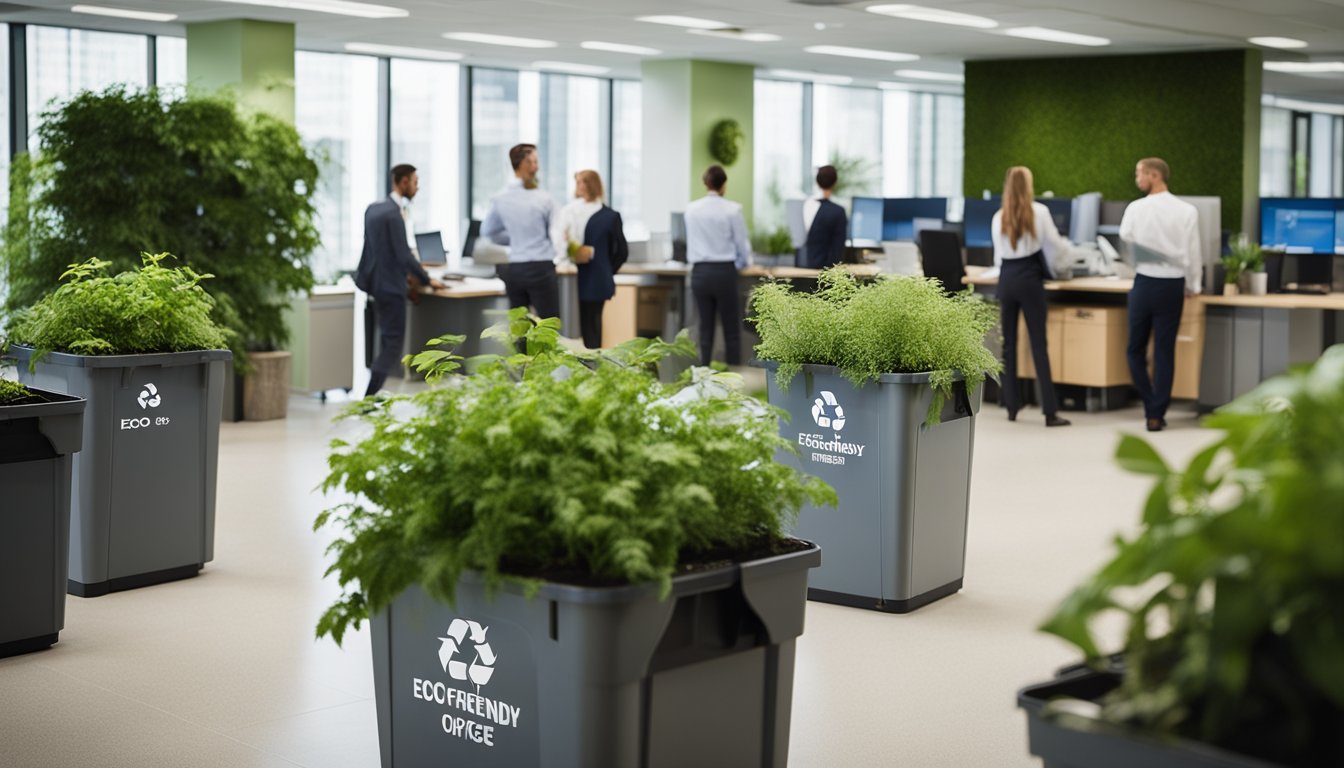Late updated: 22 Nov 2024 15:11
Written by: Amber Collins
Creating An Eco-Friendly Workplace Culture In The UK: Strategies For Sustainable Success
Creating an eco-friendly workplace culture in the UK is not just beneficial for the environment; it is also an essential component of modern business strategy. In today's world, companies that prioritise sustainability tend to attract more engaged employees and positive attention from stakeholders. By implementing sustainable practices, we can not only reduce our carbon footprint but also inspire our workforce and improve our corporate reputation.

From simple changes like reducing paper usage to integrating more plants into the office, each step contributes towards creating a sustainable environment. Encouraging employees to participate in this transformation fosters a culture of responsibility and communal effort. This shift not only boosts morale but can also lead to long-term financial savings and a healthier workplace.
As we consider the future of business, integrating eco-friendly practices should be at the forefront of our strategic planning. It is an opportunity to demonstrate leadership in sustainability, setting a benchmark for others to follow. Together, we can create a more sustainable and productive workplace.
Key Takeaways
- Sustainable workplace culture attracts engaged employees.
- Simple changes can lead to financial savings.
- Leadership in sustainability sets industry benchmarks.
Establishing the Foundation for Eco-Friendly Practices

Creating a sustainable workplace begins with understanding the environmental impact and engaging every level of the organisation. By assessing current practices, formulating comprehensive green policies, and involving employees in meaningful ways, we can create an effective and environmentally-conscious workplace culture.
Assessing Environmental Impact
To establish eco-friendly practices, we start by understanding our current environmental footprint. Conducting an environmental audit allows us to identify the key areas where our business affects the environment. This involves evaluating energy consumption, waste management practices, water usage, and supply chain sustainability.
Data from the audit should be documented to form a baseline against which progress can be measured over time. By analysing these insights, we can pinpoint specific areas ripe for improvement. Leveraging technology and expert consultations offers more precise evaluation, helping us make informed decisions on what practices to change or introduce. This proactive assessment is essential for setting realistic and achievable sustainability goals.
Formulating a Green Policy
Developing a green policy involves crafting a clear roadmap for our sustainable ambitions. This policy should outline specific targets, such as reducing carbon emissions by a certain percentage or transitioning to renewable energy sources. Stakeholder consultation enhances the policy's relevance and ensures alignment with both internal goals and external environmental standards.
Implementation of the policy requires assigning responsibilities to different teams to ensure accountability. Monitoring and review mechanisms are crucial to assess the effectiveness of the measures and adjust strategies as necessary. By establishing clear and transparent guidelines, we provide a coherent structure that helps unify efforts across the organisation, promoting systems that lead to a smaller environmental footprint.
Employee Engagement and Involvement
Active participation from our workforce is pivotal to embedding sustainable practices. Creating awareness programmes and informational workshops can educate employees on the benefits and methods of sustainability. Green teams or committees can be formed to champion eco-friendly initiatives, fostering a culture of collaboration and innovation.
Incentivising sustainable actions, such as recognising employees who propose successful green projects or reduce waste, can motivate positive change. Moreover, encouraging open communication channels allows for feedback and suggestions, increasing staff buy-in. Through continuous engagement, we ensure that our workforce remains committed and proactive in driving our sustainability agenda.
Implementing Sustainable Solutions

We can transform our workplaces by integrating sustainable practices that focus on resource management, energy efficiency, waste reduction, and procurement processes. Fostering an eco-friendly business not only benefits the environment but also enhances long-term operational efficiency.
Resource Management and Reduction Strategies
Optimising resource use is essential for sustainability. We should start by conducting audits to identify areas where resources are wasted. This might include reducing paper usage through digital tools like cloud storage and online collaboration systems. Encouraging staff to adopt habits such as double-sided printing can significantly lower paper consumption.
Water management is another critical area. Installing low-flow fixtures and regularly checking for leaks helps conserve water. We can also implement smart irrigation systems for any green spaces. It’s vital to engage employees in resource conservation efforts through workshops and incentives, gradually embedding a culture of mindfulness around resource use.
Energy Efficiency and Renewable Energy
Energy efficiency plays a pivotal role in crafting an eco-friendly workplace. Switching to energy-efficient lighting like LEDs and installing smart thermostats can result in substantial savings. It’s crucial to review energy consumption patterns and identify areas for improvement.
Transitioning to renewable energy sources such as solar or wind not only reduces our carbon footprint but also stabilises energy costs. We should consider collaborating with renewable energy providers who can offer tailored solutions. An energy-conscious culture can be promoted by encouraging staff to switch off unused devices and participate in energy-saving initiatives, reinforcing our commitment to a sustainable future.
Waste Management and Recycling Programmes
Establishing a comprehensive waste management system, which includes reducing, reusing, and recycling, is foundational for sustainability. We must start by implementing recycling stations throughout the workplace to sort paper, plastics, and e-waste effectively. It's beneficial to partner with local recyclers who can assist in managing waste streams efficiently.
Promoting a zero-waste goal can be achieved by encouraging staff to minimise disposable items, like opting for reusable containers and cutlery. Regular waste audits can help track progress and identify new opportunities for reducing waste. Educating employees about the importance of waste reduction fosters a shared sense of responsibility and commitment to our environmental goals.
Sustainable Procurement Processes
Developing sustainable procurement processes involves selecting suppliers who adhere to environmental standards and practices. Eco-friendly business relies on sourcing products that are recyclable or made from renewable materials. We should prioritise vendors with certifications for environmental responsibility.
We must also evaluate the lifecycle of products to ensure they meet sustainability criteria from production to disposal. Engaging with suppliers who provide transparency on their sustainability measures allows us to make informed decisions. By incorporating sustainable procurement criteria into supplier evaluation, we reinforce our dedication to building a more sustainable workplace ecosystem.
Frequently Asked Questions

Creating an eco-friendly workplace culture involves implementing sustainable practices and encouraging employee engagement. Our focus is on effective strategies, successful UK examples, and creative 'go green' ideas.
What are effective strategies to promote an eco-friendly culture in the workplace?
We can integrate sustainability into daily operations by promoting recycling initiatives and reducing energy use. Offering training sessions about the environmental impact of actions helps to educate and engage employees. Establishing green teams to lead sustainability efforts encourages participation and fosters a collective commitment.
How can UK businesses implement sustainable work practices successfully?
To implement sustainable practices, businesses should start by assessing their current operations. Setting clear, achievable goals like reducing carbon footprints and increasing energy efficiency is crucial. Collaboration with stakeholders and open communication with employees ensure everyone is aligned and motivated to achieve these goals.
What examples exist of successful green initiatives in UK offices?
Some UK offices have adopted renewable energy sources, installed smart meters, and transformed office spaces with energy-efficient lighting. Encouraging cycling to work schemes and providing facilities for this can also be effective. These efforts not only reduce environmental impact but also enhance corporate reputation.
What measures can be taken to encourage environmental responsibility among employees?
We can encourage responsibility by offering rewards for sustainable actions and recognising green achievements. Creating an open dialogue about sustainability goals and encouraging feedback can empower employees. Engaging them with workshops and volunteer opportunities related to eco-friendly initiatives fosters a sense of ownership and accountability.
How can a business measure the impact of sustainability initiatives in the workplace?
Measuring impact involves tracking key performance indicators such as energy consumption, waste reduction, and employee participation rates. Regularly reviewing these metrics and adjusting strategies as needed ensures sustained progress. Sharing results transparently with staff keeps everyone informed and motivated.
What are some creative 'go green' ideas for office settings that have proven to be effective?
Innovative ideas include implementing 'bring-your-own-cup' policies to reduce waste and holding office challenges around reducing paper use or conserving energy. Hosting workshops on upcycling or planting office greenery can engage staff creatively. These approaches contribute to a vibrant and sustainable workplace culture.
